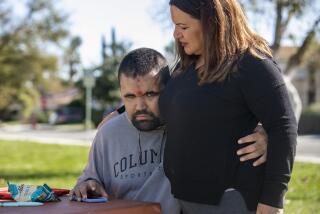When Custody Disputes Go Global
- Share via
Like a ghostly imprint, the faint mark on George Uhl’s mirror is still there. It was made by his son, David, two years ago. Uhl remembers clearly the day he held his only child up to the mirror above his living room fireplace. The boy reached out to touch his reflection.
It was April 29, 1998. David was only 11 months old. Within a matter of minutes, the boy was on his way to Germany.
His mother, from whom Uhl was separated, pledged to return him within two months. She never brought him back.
Since then, Uhl has lived in agony. He has seen little of his son. He was permitted a series of 90-minute visits by a German court just before Christmas last year. The only other opportunity came last April when he tried--and failed--to take his son back to the United States. The 48-year-old physician considers David a victim of state-sanctioned kidnapping.
Efforts to persuade German authorities to respect the custody provisions made in Baltimore County (Md.) Circuit Court and signed by his ex-wife have been fruitless.
“I’m sorry, but I can’t talk about this without being tearful,” said Uhl, a clinical neurologist and a federal research scientist, as his eyes welled up, his voice choked. “I love him, and I hope he understands that. It’s such a horrendous thing.”
The experience has placed Uhl squarely in the arena of international diplomacy and something called the Hague Convention of 1980. The international treaty requires custody decisions to be made in the country where a child lived before an abduction--unless a return poses a grave risk to the child, such as in cases of child abuse or neglect.
German courts have become notorious for ignoring that pact. Of the approximately 1,000 cases of foreign abduction pending with the State Department, 58 involve Germany, making it second only to Mexico. Some child welfare advocates believe the actual number of child abduction cases may be 10 times that figure because many aren’t reported to the State Department.
Earlier this year, Uhl appeared at a news conference on Capitol Hill to support a House resolution calling on nations to comply with the Hague treaty and spotlighting Germany--along with Austria, Sweden, Honduras and Mexico--for failing to “fully implement” its provisions. The measure passed the House without a dissenting vote.
Lobbying for international justice is not a comfortable position for a man more accustomed to studying molecular neurobiology, but Uhl is passionate about bringing David home. Placing political pressure on Germany through the media and U.S. politicians is his best chance to see his son, he believes.
“My wife is a kidnapper. The German government is complicit in this,” he said.
The subject of child abductions was raised during President Clinton’s recent visit to Germany, much to the chagrin of German leadership. German Chancellor Gerhard Schroder pledged to set up a task force of experts to investigate the custody disputes but warned that he could not interfere with the court system.
Two high-profile cases have contributed greatly to the furor. One involves Lady Catherine Meyer, the wife of the British ambassador to Washington. She has two sons from a previous marriage to a German doctor but has had limited access to them since he abducted them in 1994.
Even more harrowing is the experience of Joseph Cooke, a 31-year-old New York resident whose German-born wife took their two children to Germany without his knowledge and caused them to be turned over to the German Youth Authority. Despite seven years of efforts, he has been unable to retrieve them--the German courts having decided they are better off with a German foster family than returned to their father.
“Contrast this with Elian Gonzalez,” said Nancy Hammer, director of the international division of the National Center for Missing and Exploited Children, a nonprofit organization that gathers information about abducted children.
“This goes on with the knowledge of most people in the United States. It’s only been recently that the collective voice has been heard.”
“It’s taken its toll; it’s been a lot for George,” said Uhl’s mother, Jeanne. “There are times when you think this isn’t really happening. Maybe that’s just part of the body’s defense mechanism so you can cope.”
A Happy Beginning
It wasn’t supposed to work out like this, of course.
David was born May 8, 1997, to Uhl and his wife, Katherina Gotzler-Uhl. His birth announcement (on rocking horse stationery) informed family and friends that he was 7 pounds, 12 ounces and 23 inches long.
Uhl had met his wife by responding to a personal ad. She was a research fellow at Wilmer Eye Institute in Maryland. She was 5-foot-3, with brown hair and eyes, a native of Romania who had lived in Germany. She went by Katie.
He was, and is, a head of a lab studying the neurobiology of addiction for the National Institute on Drug Abuse and an associate professor at Johns Hopkins in Baltimore. He is 6-foot-2, 10 years her senior and wears thick, wire-rimmed glasses. His blond hair is turning silvery-gray. He admits to being somewhat shy.
Uhl found her charming and engaging. They had been dating for only a matter of months when she told him she was pregnant. Uhl had long wanted a child but hadn’t expected one quite so soon. Yet when the pregnancy was almost lost--and Uhl had a chance to see his son in the flickering images of a computer ultra-sound machine--he fell in love with the baby.
“We bonded early,” he recalled. “We got attached in utero.”
The couple wed in March 1997 in the Baltimore County courthouse. It was his first marriage, her second. But even before David was born two months later, problems developed in the relationship. His wife was struggling in her work and talked about returning to Germany.
Things worsened when Katie’s mother moved in after David’s birth, Uhl recalls. The arguments worsened and became more frequent. He thought maybe it was a cultural difference. The couple talked about separating.
On July 20, court records show that Katherina Gotzler-Uhl filed for a protective order against her husband claiming he had punched and kicked her and drove away with David in his car without her consent.
George Uhl says none of that is true, but the protective order--which was allowed to expire two weeks later--ended up hurting his position in the divorce. Soon he had to move out of the home he’d purchased 10 years earlier to live with his parents just south of Annapolis. A judge decided he could have custody of his son on weekends.
On April 28, 1998, he signed a child custody agreement that would allow his wife to return to Germany. The agreement allowed him to have his son one month for every two that David spent with his mother, promised that Uhl would have free access to his son by phone, that she would bring him back to the United States in a matter of weeks and that Baltimore County Circuit Court would retain authority to decide any future issues over child custody and visitation. She and David left the next day after Uhl wrote her court-ordered checks totaling more than $32,500 in alimony and child support as a lump sum payment.
Not long after, Uhl discovered that his wife’s forwarding address was little more than a mail drop. For months, he had no idea where she was living. He hired investigators to find her--without success. Meanwhile, the same Baltimore County judge who had permitted Uhl’s wife to return to Germany now ruled that the mother “never had any intention of complying” with the U.S. custody arrangements and awarded sole custody of David to Uhl. Eventually, Uhl tracked his ex-wife down. They wound up in a German court.
A judge there ruled that the child had become a native of Germany the moment he stepped off the plane, and it would be up to the boy’s mother to determine what, if any, visitation Uhl would be permitted. An appeal was unsuccessful.
David’s mother, now living in Munich as Katherina Gotzler, declined to be interviewed for this article. During a telephone call, she said she was concerned that an American reporter would be biased against her.
“It’s much more complicated than you already know,” she said.
Uhl was permitted to visit David several times in November and December in a room monitored by German officials. The boy knew no English and little German. He spoke Hungarian. They hugged and kissed.
Six months later, Uhl tracked his son down again. He discovered the boy had been living with his ex-wife’s parents in western Hungary. With the help of a child “rescue” organization, he hired two men, and all three showed up at the modest home of his former in-laws. He took his son--not forcibly, he insists--but over the grandparents’ objections and without his ex-wife’s consent.
But David never made it to the United States. French police removed them from a plane in Paris, and David presumably was returned to his mother. No charges were filed. Still, Uhl knows he didn’t help his position with the German court.
“I was desperate,” he says.
Sometime after Uhl’s attempt to take back his son, his former father-in-law suffered a fatal heart attack. In a recent phone call to Jeanne Uhl, Katherina Gotzler blamed her ex-husband’s actions for her father’s death.
Marcus E. Rosenlehner, a Washington-based lawyer who has represented clients in 10 such international child custody cases, including Uhl’s, says he would have advised Uhl not to take such action but does not believe his client broke any laws.
“It was a desperate and not very thought-out step to get his son back,” said Rosenlehner, an associate with Patton Boggs in Washington who is licensed to practice in Germany.
Donald J. Cramer, a Munich lawyer who has represented Gotzler in the German courts, said Uhl’s efforts amounted to “Wild West child stealing.” He said Gotzler’s own decision not to return the child to the U.S. did not amount to an abduction but a disagreement over visitation.
Uhl said he feels duped by his ex-wife. But he also blames his lawyers in Baltimore for failing to recognize the danger.
He’s angry at the court system that sided with his wife--even forcing him to continue to pay her child support after she returned to Germany, essentially underwriting his child’s abduction.
He’s unhappy with the State Department for showing so little interest in international child custody cases. In two years, the search for his son has cost him $400,000, his life’s savings. And he still has trouble sleeping at night. He scans the newspapers and the Internet daily for stories about international child custody cases. He sends and receives e-mail from parents in similar straits. He has his son’s photos, his crib, a few of his toys still tucked away in his room and the palm print on the mirror he never wipes away to keep his hope alive.
“There’s nothing to strip away the excesses of your life than to know there’s just one thing you care about,” Uhl said. “I’ve been living a nightmare that I wouldn’t wish on anyone else.”
More to Read
Sign up for Essential California
The most important California stories and recommendations in your inbox every morning.
You may occasionally receive promotional content from the Los Angeles Times.













